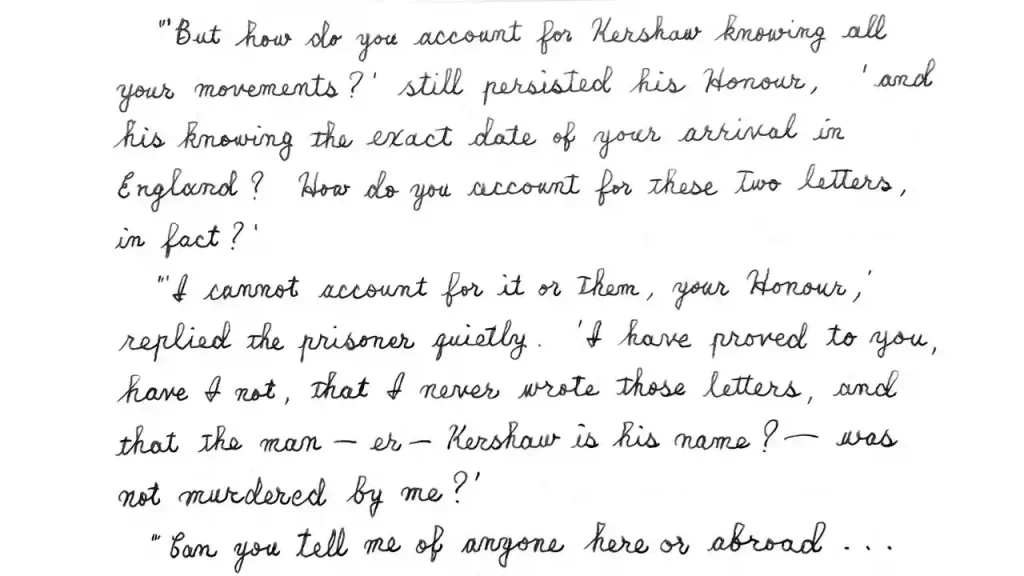“‘But how do you account for Kershaw knowing all your movements?’ still persisted his Honour, ‘and his knowing the exact date of your arrival in England? How do you account for these two letters, in fact?’
The Old Man in the Corner
- modifier: どのようにして
- subject: あなた
- predicate: せつめいする?
「『しかし、カーショーがあなたの行動すべてを知っていたことをどう説明するのです?』裁判長がしつこく続けました。
『彼はあなたがイングランドに到着する正確な日付を知っていましたよね?
あなたは例の二通の手紙をどう説明するのです?』
- 行動(こうどう, action)
- 到着(とうちゃく, arrival)
- 正確(せいかく, exact)
“‘I cannot account for it or them, your Honour,’ replied the prisoner quietly. ‘I have proved to you, have I not, that I never wrote those letters, and that the man—er—Kershaw is his name?—was not murdered by me?’
- subject: わたし
- predicate: しょうめいする
「『私はそれらを説明できません、裁判長』被告人が静かに答えました。
『私はあなたに証明してきました。私はそれらの手紙を書いていませんし、カーショーという名前の男も殺していません』」
- 説明(せつめい, explanation)
- 証明(しょうめい, prove)
“‘Can you tell me of anyone here or abroad who might have heard of your movements, and of the date of your arrival?’
- predicate: おしえてください
「『あなたの移動と到着日を知っていた人物を教えてください』」
- 移動(いどう, movement)
- 到着日(とうちゃくび, arrival date)
“‘My late employés at Vladivostok, of course, knew of my departure, but none of them could have written these letters, since none of them know a word of English.’
- subject: しようにん
- predicate: しっている
「『ウラジオストクにいる私の使用人たちは私の出発を知っていました。しかし誰もその手紙を書いていません。誰も英語がわからないのですから』」
- 使用人(しようにん, servant)
- 出発(しゅっぱつ, departure)
“‘Then you can throw no light upon these mysterious letters? You cannot help the police in any way towards the clearing up of this strange affair?’
- subject: あなた
- predicate: かいめいできない
「『それでは、あなたはその手紙の謎を解明できないのですか?
あなたは警察に手を貸して、この奇妙な出来事を解明することができないのですか?』」
- 解明(かいめい, solve)
“‘The affair is as mysterious to me as to your Honour, and to the police of this country.’
- subject: このじけん
- predicate: ふかしぎ
「『この事件は、裁判長と同様に、私にとっても不可思議なものです。この国の警察にとっても』」
- 事件(じけん, incident)
“Francis Smethurst was discharged, of course; there was no semblance of evidence against him sufficient to commit him for trial.
- subject: スメサースト
- predicate: しゃくほうされる
「フランシス・スメサーストは当然釈放されました。彼を拘束するに足る証拠はありませんでした」
- 釈放(しゃくほう, release)
- 拘束(こうそく, detain)
- 証拠(しょうこ, evidence)
The two overwhelming points of his defence which had completely routed the prosecution were, firstly, the proof that he had never written the letters making the assignation, and secondly, the fact that the man supposed to have been murdered on the 10th was seen to be alive and well on the 16th.
「検察を打ち負かした被告側の二つの大きなポイントは、第一に、彼が密会を誘う手紙を書いていないという証明。そして第二に、10日に殺されたと思われる男が16日に生きていたという事実でした」
- 検察(けんさつ, prosecution)
- 被告側(ひこくがわ, defendant’s side)
- 証明(しょうめい, proof)
- 事実(じじつ, fact)
But then, who in the world was the mysterious individual who had apprised Kershaw of the movements of Smethurst, the millionaire?”
「しかしそうすると、誰が大富豪の行動をカーショーに知らせたのでしょう?」
Reference : The Old Man in the Corner by Baroness Orczy (project gutenberg)
English Story With Easy Japanese Translation
